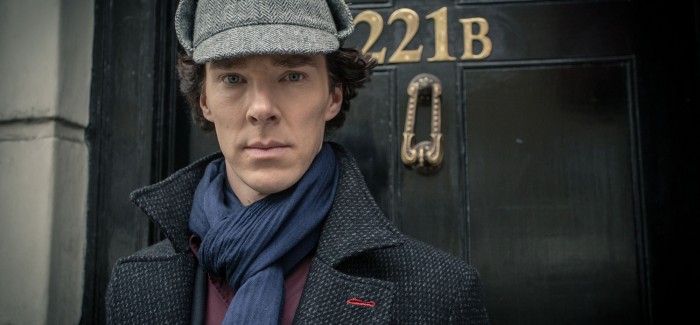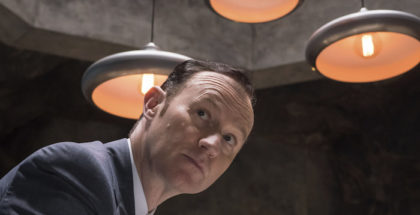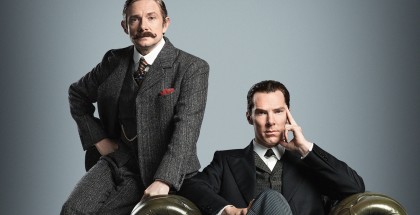Molly and Mycroft: The unsung heroes of BBC’s Sherlock
David Farnor | On 01, Jan 2014
We look back at Season 1 and 2 of Steven Moffat and Mark Gatiss’ modern-day reboot
It’s a three-patch problem.
That’s how Sherlock Holmes described his first case in A Study in Pink. That throwaway line set the tone for the BBC’s reboot of Arthur Conan Doyle’s detective; faithful, yet playful.
The casting delivered on that promise: Benedict Cumberbatch as Sherlock was an inspired choice, his pale face and otter-like gaze conveying an almost un-human-like mind that was skilled at finding out everything about the people around him and simultaneously not giving a damn. “Everyone shut up,” he ordered Rupert Graves’ Detective Inspector Lestrade. “Anderson, face the other way,” he added. “You’re putting me off.”
Why? There was no mystery about our hero’s ambivalence to those around him. He told us almost immediately: “I’m not a psychopath, I’m a high-functioning sociopath.” But while that could have left Sherlock as a one-note character, an anti-social man with a disregard of other people’s feelings, rights or needs, Mark Gatiss and Steven Moffat’s scripts fleshed him out over two season of six 90-minute episodes.
Watson: “People want to know you’re human.”
Holmes: “Why?”
“Because they’re interested.”
“No they’re not. Are they?”
Part of that comes from the pairing of Cumberbatch with Martin Freeman’s Dr. John Watson, an Afghanistan veteran with morals, a sense of humour and a taste for danger. With his occasional love life and string of failed dates – often down to the interference of Sherlock – Freeman provides the everyman for us to access the inaccessible, to engage with the unengaged and follow unfollowable mysteries.
But Sherlock’s sympathetic side and depth stems from two other unsung characters co-written by Mark Gatiss – one of them played by himself.
We first meet him in Episode One, where he describes himself as Sherlock’s “archenemy”. Sneering and twirling his umbrella, his nose turned up at the common brains around him, he’s the kind of nemesis we expect to find in a Holmes story. The assumption is quick: Moriarty. But while the former League of Gentlemen’s ability to juggle sinister and funny makes him the ideal candidate for an evil genius Professor, Gatiss’ decision to cast himself as Sherlock’s brother, Mycroft Holmes, sets us up for the show’s real villain. Andrew Scott’s unhinged Moriarty, when he does arrive, is shocking – not just because of his manic screen presence, but because he’s the exact opposite of Gatiss’ calm, collected brainiac.
The two siblings two snipe at each other every time they meet, but Mycroft’s secret concern – he approaches Watson initially to make sure his brother is ok – gives Sherlock a human edge and, frequently, a back-story that we wouldn’t otherwise have. That information is, in Season Two, Holmes’ downfall after his personal history is shared with the wrong people, an example of how carefully Gatiss and Moffat weave Mycroft’s role into the plot. Because Mycroft is essential; not just for the character, but the narrative too. His lazy position at the heart of the British government provides the show with new cases and clients, from the Queen to military research institutes. Moriarty may be the yang to Sherlock’s yin, and Watson may be his loyal companion, but his other half is Mycroft. Without him, the 21st Century world of Holmes wouldn’t make sense.
The other key part of the Sherlock puzzle is Molly Hooper. If Mycroft brings the brains to the show, Louise Brealey brings the heart as the morgue girl with a crush on the detective.
In fact, Brealey’s quiet delivery and hopeful smile were so good that despite being a one-scene person written for the pilot, Gatiss and Moffat decided to turn her into a regular: the only major character in the show not based on Doyle’s books.
Why? Because she offers a way into Sherlock’s character that Watson can’t offer. He acts as a way into the story; she acts as a way into his head.
“How do we not know?” Mrs. Hudson (the delightful Una Stubbs) says to Watson in A Scandal in Belgravia, as Sherlock pines over Irene Adler. “It’s Sherlock,” Freeman replies. “How will we ever know what goes on in his head?”
“You always say such horrible things. Every time. Always. “
Lara Pulver’s dominatrix, Irene, proves a match for Sherlock in Season Two, confounding his Spidey Senses and making him hot under his trench coat collar. But while he is clearly smitten with her and her intellectual trickery, Molly is something that carries more weight: truthful.
“I think she’s fascinating because over time, certainly by the time you get to the second series, she wins every encounter with Sherlock,” Moffat told Digital Spy. “All the time, always. And by being honest and truthful with him. He’s so on the back foot now with [her].”
That emotional honesty is what makes her such a likeable and important character, both to us and to Sherlock. Without her constant heartbreak and his cruel using of her skills, we don’t get a sense of Sherlock’s appeal (or lack of) to the female sex – interaction with women on that level is mostly absent from Conan Doyle’s books – apart from his occasional displays of sympathy to Mrs. Hudson.
“Are you OK? Don’t just say you are, because I know what that means, looking sad when you think no one can see…”
When The Reichenbach Fall finally arrives, then, Sherlock’s admission that her timid background character “does count” offeres a depth that was missing from his initial presentation as a sociopath.
And so, as part of the show’s warmth and winding plot twists, Molly and Mycroft have had an important role in BBC’s Sherlock, both playful and faithful parts of Gatiss and Moffat’s adaptation. They may not take up much screen time, but Molly and Mycroft are the overlooked driving force behind the series. For every three-patch problem Sherlock faces, they’re a two-part solution.
As the eponymous sleuth returns tonight and we finally discover how he faked his own death, don’t be surprised if one of them had a hand in it.
Sherlock is available on Netflix UK, as part of an £9.99 monthly subscription. It is also available on BritBox, as part of a £5.99 monthly subscription.
Where can I buy or rent Sherlock online in the UK?
Photo: BBC/Hartswood Films






















